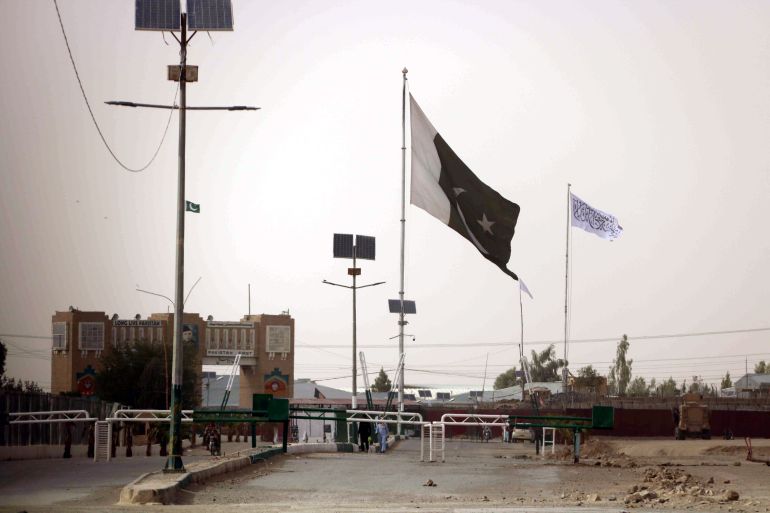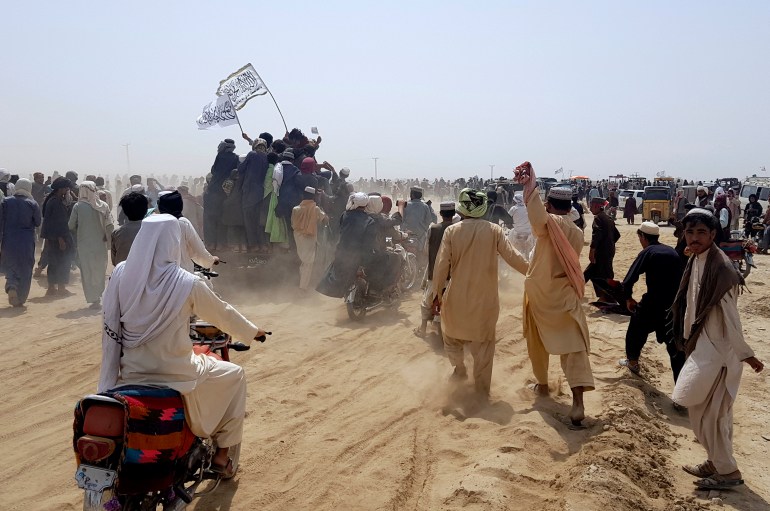Afghan gov’t claims it retook border crossing, Taliban denies
Taliban dismisses Afghan government claim that a crucial border crossing with Pakistan was recaptured by government forces.

Taliban has dismissed a claim by an Afghan government official that a border crossing it captured in the country’s southern border with Pakistan on Wednesday was retaken by the Afghan security forces.
Taliban fighters captured the Spin Boldak-Chaman border crossing on Wednesday, the second most important crossing on the border with Pakistan and an important source of revenue for the Western-backed government in Kabul.
Keep reading
list of 4 itemsThe US is leaving. What’s next for Afghanistan?
‘Talibanned’: Favourite Afghan pastimes again under threat
Is it time to take the Taliban seriously?
The Afghan armed group has in recent weeks also captured border crossings with Iran, Uzbekistan and Tajikistan as US forces are about to complete withdrawal from the war-torn country after 20 years. The group has been waging an armed rebellion since it was dislodged from power in a US-led invasion in 2001.
A senior government official in the southern Kandahar province, where the crossing is located, told Reuters news agency on Thursday that Afghan forces retook the area’s main market, the customs department and other government installations in the border town a few hours later on Wednesday.
Government forces, who had initially fallen back to minimise civilian and security personnel losses, were conducting clearing operations, the official said.
He warned that the threat remained high as Taliban fighters outnumbered Afghan security forces in the area.
But Taliban spokesman Zabihullah Mujahid said his forces still held the border post.
“It is merely propaganda and a baseless claim by the Kabul administration,” he told Reuters.
Pakistan, worried about a spillover of fighting, had shut its side of the border at the second busiest border crossing on the main commercial artery between the second Afghan city of Kandahar and Pakistani ports.

‘Humanitarian crisis beginning to unfold’
Al Jazeera’s Kamal Hyder reporting from Peshawar, Pakistan said the “takeover of Spin Boldak came as a surprise”.
“A humanitarian crisis was beginning to unfold,” Hyder said.
“Tens of thousands of people [were] stranded on both sides. This is a very busy border, given the fact that most of the medical emergencies from Afghanistan cross to Pakistan because there are better medical facilities here, and also the fact that many families [were going to cross] to meet their relatives because Eid Holidays were approaching.
“But for Pakistan, [there are also] huge implications given the fact that any fighting between the Afghan National Army, should they decide to go on the offensive against the Taliban in Spin Boldak, has the recipe for a disaster, [as it] could spill over into Pakistan. Because of that Pakistani Security Forces are also beefing up their positions,” he added.
On Thursday, the Afghan Taliban and the Pakistani government agreed to re-open the border crossing to allow stranded people through.
Clashes between the Taliban and government forces have intensified as the United States-led international forces have been withdrawing and the Taliban has captured several districts and other border crossings in the north and the west.
With security deteriorating sharply, diplomatic efforts have focussed on pushing the rival Afghan sides to make progress towards a ceasefire at talks that they have been holding intermittently in Qatar.
President Ashraf Ghani was due to meet regional leaders in Uzbekistan on Thursday as the deteriorating security raises fears of a new Afghan refugee crisis and Pakistan said it would host a conference of senior Afghan leaders in a bid to find solutions.
Nader Nadery, Afghan government peace negotiator told Al Jazeera they were “genuinely and very strongly pushing for meaningful talks”.
“We want to end this war once and forever and to reach a political settlement and a shared future,” he said.
“[And] at the same time, our forces are trying to protect the centre of the population.
“The report I released today of the service sector affected by the war suggested that 13 million people, Afghans, are being affected by not receiving public services across those districts that are taken by the Taliban, which is one-third of the population. We are protecting the centres of population and our forces are protecting them … but at the same time we are pressing for peace, political settlement, and genuinely we are ready to do so,” he added.
Backchannel talks
Meanwhile, former Afghan President Hamid Karzai and some top Afghan political leaders are expected to fly to Qatar this weekend for talks with members of the Taliban who have an office in the capital Doha in an effort to revive the deadlocked peace process.
Al Jazeera’s Charlotte Bellis reporting from Kabul said all the conditions of previous negotiations “have not been met”.
There were stipulations “that as part of the US and NATO withdrawal there would be a ceasefire, there would be political negotiations [and] that the Taliban would get their prisoners out and the leaders to be out of [a UN] blacklist.
“Now the US and NATO are withdrawing, but some of these conditions still haven’t been met.”
The Afghan government has “already released 5,000 [Taliban] prisoners, and they are saying how many more do we have to release … We should be talking more about political negotiations and a ceasefire first as opposed to letting more of your prisoners out … so this is the sticking point at play,” she added.
The Doha peace talks between rival Afghan sides were initiated after the US signed an agreement with the Taliban in February 2020. It was aimed at reaching a lasting peace in the war-torn country.
The US pledged to withdraw all international troops by April of 2021, while the Taliban promised to guarantee US security interests as part of the deal.
However, the Taliban continued to target Afghan forces, saying the Afghan government was not a party to the Doha agreement. Taliban, which ruled Afghanistan between 1996 and 2001, has dubbed the West-backed Kabul administration a “puppet regime”.
US President Joe Biden did not reverse his predecessor’s decision to withdraw American troops, but he moved the deadline to September 11, coinciding with the 20th anniversary of the 9/11 attacks which triggered the US invasion of the country.